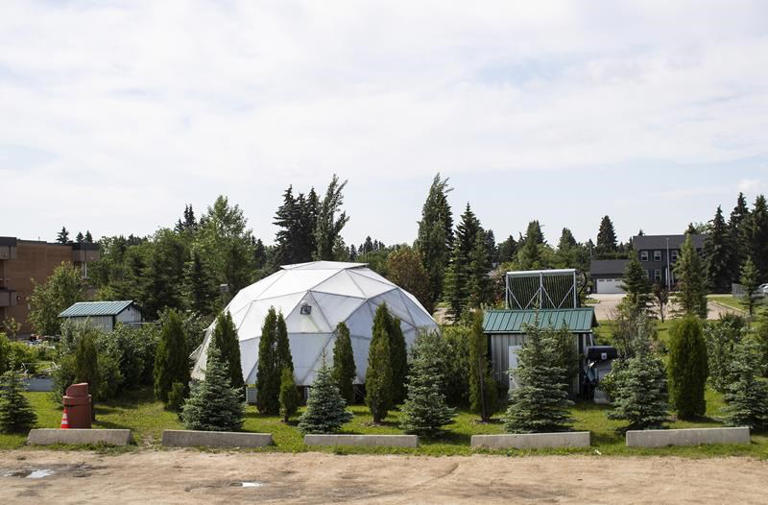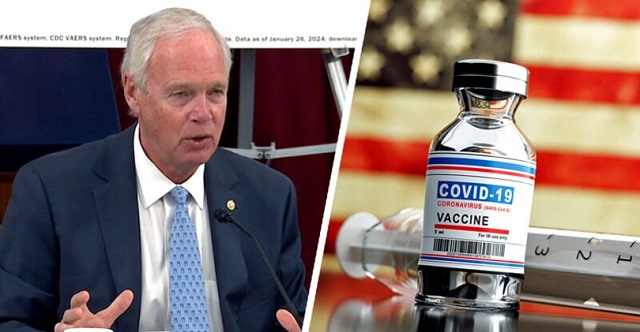Alberta
Beehives and goat farms: Lacombe school shortlisted in global environmental contest

Taylor Perez says she learned more about her passions while tending beehives, goats and fruit trees at her central Alberta high school than sitting through lessons in a classroom.
“These are all skills we don’t learn in regular classes,” says the 18-year-old student at Lacombe Composite High School.
“You’re not going to learn how to collaborate with community members by sitting in a classroom learning about E = mc2.”
Perez and her classmates are buzzing with excitement after their school’s student-led beekeeping program, goat farm, fruit orchard, tropical greenhouse and other environmental projects were recognized in a global sustainability contest among 10 other schools.
It’s the only North American school to be shortlisted by T4 Education, a global advocacy group, in its World’s Best School Prize for Environmental Action contest.
“The projects are coming from the students’ own hearts and passion for taking care of the environment,” says Steven Schultz, an agriculture and environmental science teacher who has been teaching in Lacombe since 1996.
“They are going to be our community leaders — maybe even our politicians — and for them to know what the heartbeat of their generation is (is) extremely important.”
Schultz says the projects are pitched and designed by students in the school’s Ecovision Club, to which Perez belongs, and he then bases a curriculum around those ideas.
The school of about 900 students began reducing its environmental footprint in 2006 when a former student heard Schultz say during a lesson on renewable energy that “words were meaningless or worthless without action,” the 56-year-old teacher recalls.
“She took that to heart and a year later she came back and told me that she wanted to take the school off the grid.”
Schultz and students watched a fire burn down solar panels on the school’s roof in 2010, an event that further transformed his approach to teaching.
“As their school was burning, my students gathered in tears. That day I realized that students really care about the environment and they really care about the projects that they were involved in.”
Since then, 32 new solar panels have been installed, and they produce up to four per cent of the school’s electricity. After the fire, students also wanted to clean the air in their classrooms so they filled some with spider plants, including one in the teachers’ lounge.
More recently, students replaced an old portable classroom on school property with a greenhouse that operates solely with renewable energy. It’s growing tropical fruits, such as bananas, pineapples, and lemons, and also houses some tilapia fish.
Two acres of the school are also covered by a food forest made up of almost 200 fruit trees and 50 raised beds where organic food is grown.
The school also works with a local farm and raises baby goats inside a solar-powered barn that was built with recycled material.
“They breed and milk them at the farm because there are really tight regulations,” says Schultz.
“We take the excrement from the goats and the hay and use it as mulch and fertilizers for our garden. The goats also chew up the grass and allow us not to have to use lawn mowers and tractors”
Perez said her favourite class is the beekeeping program with 12 hives that produce more than 300 kilograms of honey every year.
“I love that they have different roles in their own little societies,” Perez says of the bees.
She says while working with local businesses and groups as a part of her curriculum, she learned she’s passionate about the environment and wants to become a pharmacist so she can continue giving back to her community.
James Finley, a formerly shy Grade 10 student, says the Ecovision Club and environment classes have helped get him out of his comfort zone.
“I made friends, which was a hard thing for me in the beginning. But now I have, like, hundreds,” says the 16-year-old, who enjoyed the lessons he took on harvesting.
“Taylor and Mr. Schultz were the main people that made me stay.”
Schultz says the winners of the contest are to be announced in the fall.
A prize of about $322,000 will be equally shared among five winners.
This report by The Canadian Press was first published Sunday, July 3, 2022.
—
This story was produced with the financial assistance of the Meta and Canadian Press News Fellowship.
Fakiha Baig, The Canadian Press
Alberta
Danielle Smith slams Skate Canada for stopping events in Alberta over ban on men in women’s sports

From LifeSiteNews
The Alberta premier has denounced Skate Canada as ‘disgraceful’ for refusing to host events in the province because of a ban on ‘transgender’ men in women’s sports.
Alberta Premier Danielle Smith has demanded an apology after Skate Canada refused to continue holding events in Alberta.
In a December 16 post on X, Smith denounced Skate Canada’s recent decision to stop holding competitions in Alberta due to a provincial law keeping gender-confused men from competing in women’s sports.
“Women and girls have the right to play competitive sports in a safe and fair environment against other biological females,” Smith declared. “This view is held by a vast majority of Albertans and Canadians. It is also common sense and common decency.”
Women and girls have the right to play competitive sports in a safe and fair environment against other biological females.
This view is held by a vast majority of Albertans and Canadians. It is also common sense and common decency.
Skate Canada‘s refusal to hold events in… pic.twitter.com/n4vbkTx6B0
— Danielle Smith (@ABDanielleSmith) December 16, 2025
“Skate Canada‘s refusal to hold events in Alberta because we choose to protect women and girls in sport is disgraceful,” she declared.
“We expect they will apologize and adjust their policies once they realize they are not only compromising the fairness and safety of their athletes, but are also offside with the international community, including the International Olympic Committee, which is moving in the same direction as Alberta,” Smith continued.
Earlier this week, Skate Canada announced their decision in a statement to CBC News, saying, “Following a careful assessment of Alberta’s Fairness and Safety in Sport Act, Skate Canada has determined that we are unable to host events in the province while maintaining our national standards for safe and inclusive sport.”
Under Alberta’s Fairness and Safety in Sport Act, passed last December, biological men who claim to be women are prevented from competing in women’s sports.
Notably, Skate Canada’s statement failed to address safety and fairness concerns for women who are forced to compete against stronger, and sometimes violent, male competitors who claim to be women.
Under their 2023 policy, Skate Canada states “skaters in domestic events sanctioned by Skate Canada who identify as trans are able to participate in the gender category in which they identify.”
While Skate Canada maintains that gender-confused men should compete against women, the International Olympic Committee is reportedly moving to ban gender-confused men from women’s Olympic sports.
The move comes after studies have repeatedly revealed what almost everyone already knew was true, namely that males have a considerable innate advantage over women in athletics.
Indeed, a recent study published in Sports Medicine found that a year of “transgender” hormone drugs results in “very modest changes” in the inherent strength advantages of men.
Additionally, male athletes competing in women’s sports are known to be violent, especially toward female athletes who oppose their dominance in women’s sports.
Last August, Albertan male powerlifter “Anne” Andres was suspended for six months after a slew of death threats and harassments against his female competitors.
In February, Andres ranted about why men should be able to compete in women’s competitions, calling for “the Ontario lifter” who opposes this, apparently referring to powerlifter April Hutchinson, to “die painfully.”
Interestingly, while Andres was suspended for six months for issuing death threats, Hutchinson was suspended for two years after publicly condemning him for stealing victories from women and then mocking his female competitors on social media. Her suspension was later reduced to a year.
Alberta
Alberta’s huge oil sands reserves dwarf U.S. shale

From the Canadian Energy Centre
By Will Gibson
Oil sands could maintain current production rates for more than 140 years
Investor interest in Canadian oil producers, primarily in the Alberta oil sands, has picked up, and not only because of expanded export capacity from the Trans Mountain pipeline.
Enverus Intelligence Research says the real draw — and a major factor behind oil sands equities outperforming U.S. peers by about 40 per cent since January 2024 — is the resource Trans Mountain helps unlock.
Alberta’s oil sands contain 167 billion barrels of reserves, nearly four times the volume in the United States.
Today’s oil sands operators hold more than twice the available high-quality resources compared to U.S. shale producers, Enverus reports.
“It’s a huge number — 167 billion barrels — when Alberta only produces about three million barrels a day right now,” said Mike Verney, executive vice-president at McDaniel & Associates, which earlier this year updated the province’s oil and gas reserves on behalf of the Alberta Energy Regulator.
Already fourth in the world, the assessment found Alberta’s oil reserves increased by seven billion barrels.
Verney said the rise in reserves despite record production is in part a result of improved processes and technology.
“Oil sands companies can produce for decades at the same economic threshold as they do today. That’s a great place to be,” said Michael Berger, a senior analyst with Enverus.
BMO Capital Markets estimates that Alberta’s oil sands reserves could maintain current production rates for more than 140 years.
The long-term picture looks different south of the border.
The U.S. Energy Information Administration projects that American production will peak before 2030 and enter a long period of decline.
Having a lasting stable source of supply is important as world oil demand is expected to remain strong for decades to come.
This is particularly true in Asia, the target market for oil exports off Canada’s West Coast.
The International Energy Agency (IEA) projects oil demand in the Asia-Pacific region will go from 35 million barrels per day in 2024 to 41 million barrels per day in 2050.
The growing appeal of Alberta oil in Asian markets shows up not only in expanded Trans Mountain shipments, but also in Canadian crude being “re-exported” from U.S. Gulf Coast terminals.
According to RBN Energy, Asian buyers – primarily in China – are now the main non-U.S. buyers from Trans Mountain, while India dominates purchases of re-exports from the U.S. Gulf Coast. .
BMO said the oil sands offers advantages both in steady supply and lower overall environmental impacts.
“Not only is the resulting stability ideally suited to backfill anticipated declines in world oil supply, but the long-term physical footprint may also be meaningfully lower given large-scale concentrated emissions, high water recycling rates and low well declines,” BMO analysts said.
-

 Alberta1 day ago
Alberta1 day agoDanielle Smith slams Skate Canada for stopping events in Alberta over ban on men in women’s sports
-

 Health2 days ago
Health2 days agoSaskatchewan woman approved for euthanasia urged to seek medical help in Canada rather than US
-

 Indigenous2 days ago
Indigenous2 days agoResidential school burials controversy continues to fuel wave of church arsons, new data suggests
-

 International24 hours ago
International24 hours agoTOTAL AND COMPLETE BLOCKADE: Trump cuts off Venezuela’s oil lifeline
-

 International2 days ago
International2 days agoFBI didn’t think it had cause to raid Trump but DOJ did it anyway
-

 Crime1 day ago
Crime1 day agoThe Uncomfortable Demographics of Islamist Bloodshed—and Why “Islamophobia” Deflection Increases the Threat
-

 COVID-1922 hours ago
COVID-1922 hours agoSenator Demands Docs After ‘Blockbuster’ FDA Memo Links Child Deaths To COVID Vaccine
-

 Energy2 days ago
Energy2 days agoLiberals Twisted Themselves Into Pretzels Over Their Own Pipeline MOU




